精选中考阅读理解100篇(附答案)(1-20)
- 格式:doc
- 大小:589.00 KB
- 文档页数:87
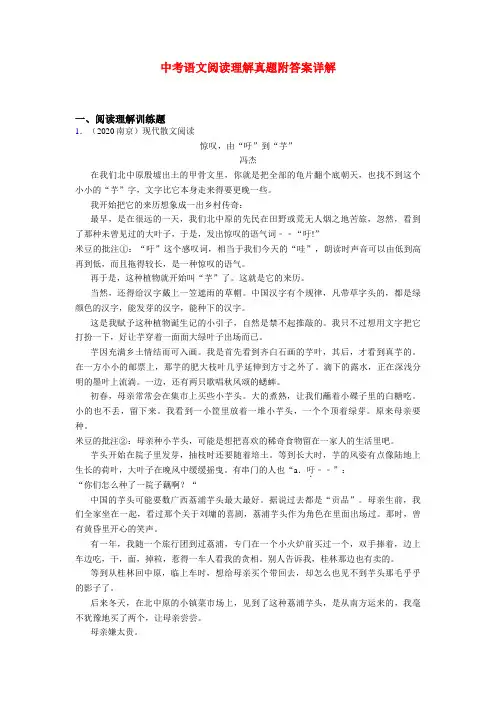
中考语文阅读理解真题附答案详解一、阅读理解训练题1.(2020南京)现代散文阅读惊叹,由“吁”到“芋”冯杰在我们北中原殷墟出土的甲骨文里,你就是把全部的龟片翻个底朝天,也找不到这个小小的“芋”字,文字比它本身走来得要更晚一些。
我开始把它的来历想象成一出乡村传奇:最早,是在很远的一天,我们北中原的先民在田野或荒无人烟之地苦旅,忽然,看到了那种未曾见过的大叶子,于是,发出惊叹的语气词﹣﹣“吁.!”米豆的批注①:“吁”这个感叹词,相当于我们今天的“哇”,朗读时声音可以由低到高再到低,而且拖得较长,是一种惊叹的语气。
再于是,这种植物就开始叫“芋”了。
这就是它的来历。
当然,还得给汉字戴上一笠遮雨的草帽。
中国汉字有个规律,凡带草字头的,都是绿颜色的汉字,能发芽的汉字,能种下的汉字。
这是我赋予这种植物诞生记的小引子,自然是禁不起推敲的。
我只不过想用文字把它打扮一下,好让芋穿着一面面大绿叶子出场而已。
芋因充满乡土情结而可入画。
我是首先看到齐白石画的芋叶,其后,才看到真芋的。
在一方小小的邮票上,那芋的肥大枝叶几乎延伸到方寸之外了。
滴下的露水,正在深浅分明的墨叶上流淌。
一边,还有两只歌唱秋风颂的蟋蟀。
初春,母亲常常会在集市上买些小芋头。
大的煮熟,让我们蘸着小碟子里的白糖吃。
小的也不丢,留下来。
我看到一小筐里放着一堆小芋头,一个个顶着绿芽。
原来母亲要种。
米豆的批注②:母亲种小芋头,可能是想把喜欢的稀奇食物留在一家人的生活里吧。
芋头开始在院子里发芽,抽枝时还要随着培土。
等到长大时,芋的风姿有点像陆地上生长的荷叶,大叶子在晚风中缓缓摇曳。
有串门的人也“a.吁.﹣﹣”:“你们怎么种了一院子藕啊?“中国的芋头可能要数广西荔浦芋头最大最好。
据说过去都是“贡品”。
母亲生前,我们全家坐在一起,看过那个关于刘墉的喜剧,荔浦芋头作为角色在里面出场过。
那时,曾有黄昏里开心的笑声。
有一年,我随一个旅行团到过荔浦,专门在一个小火炉前买过一个,双手捧着,边上车边吃,干,面,掉粒,惹得一车人看我的贪相。
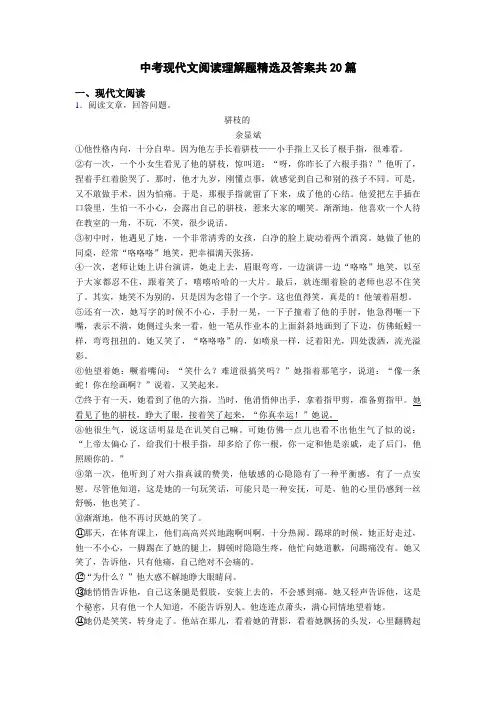
中考现代文阅读理解题精选及答案共20篇一、现代文阅读1.阅读文章,回答问题。
骈枝的_____余显斌①他性格内向,十分自卑。
因为他左手长着骈枝——小手指上又长了根手指,很难看。
②有一次,一个小女生看见了他的骈枝,惊叫道:“呀,你昨长了六根手指?”他听了,捏着手红着脸哭了。
那时,他才九岁,刚懂点事,就感觉到自己和别的孩子不同。
可是,又不敢做手术,因为怕痛。
于是,那根手指就留了下来,成了他的心结。
他爱把左手插在口袋里,生怕一不小心,会露出自己的骈枝,惹来大家的嘲笑。
渐渐地,他喜欢一个人待在教室的一角,不玩,不笑,很少说话。
③初中时,他遇见了她,一个非常清秀的女孩,白净的脸上旋动着两个酒窝。
她做了他的同桌,经常“咯咯咯”地笑,把幸福满天张扬。
④一次,老师让她上讲台演讲,她走上去,眉眼弯弯,一边演讲一边“咯咯”地笑,以至于大家都忍不住,跟着笑了,嘻嘻哈哈的一大片。
最后,就连绷着脸的老师也忍不住笑了。
其实,她笑不为别的,只是因为念错了一个字。
这也值得笑,真是的!他皱着眉想。
⑤还有一次,她写字的时候不小心,手肘一晃,一下子撞着了他的手肘,他急得咂一下嘴,表示不满,她侧过头来一看,他一笔从作业本的上面斜斜地画到了下边,仿佛蚯蚓一样,弯弯扭扭的。
她又笑了,“咯咯咯”的,如喷泉一样,泛着阳光,四处泼洒,流光溢彩。
⑥他望着她:噘着嘴问:“笑什么?难道很搞笑吗?”她指着那笔字,说道:“像一条蛇!你在绘画啊?”说着,又笑起来。
⑦终于有一天,她看到了他的六指。
当时,他消悄伸出手,拿着指甲剪,准备剪指甲。
她看见了他的骈枝,睁大了眼,接着笑了起来,“你真幸运!”她说。
⑧他很生气,说这话明显是在讥笑自己嘛。
可她仿佛一点儿也看不出他生气了似的说:“上帝太偏心了,给我们十根手指,却多给了你一根,你一定和他是亲戚,走了后门,他照顾你的。
”⑨第一次,他听到了对六指真诚的赞美,他敏感的心隐隐有了一种平衡感,有了一点安慰。
尽管他知道,这是她的一句玩笑话,可能只是一种安抚,可是,他的心里仍感到一丝舒畅,他也笑了。
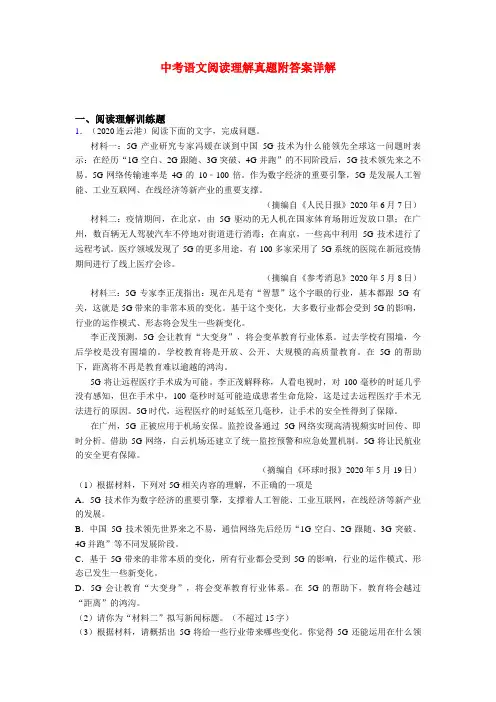
中考语文阅读理解真题附答案详解一、阅读理解训练题1.(2020连云港)阅读下面的文字,完成问题。
材料一:5G产业研究专家冯媛在谈到中国5G技术为什么能领先全球这一问题时表示:在经历“1G空白、2G跟随、3G突破、4G并跑”的不同阶段后,5G技术领先来之不易。
5G网络传输速率是4G的10﹣100倍。
作为数字经济的重要引擎,5G是发展人工智能、工业互联网、在线经济等新产业的重要支撑。
(摘编自《人民日报》2020年6月7日)材料二:疫情期间,在北京,由5G驱动的无人机在国家体育场附近发放口罩;在广州,数百辆无人驾驶汽车不停地对街道进行消毒;在南京,一些高中利用5G技术进行了远程考试。
医疗领域发现了5G的更多用途,有100多家采用了5G系统的医院在新冠疫情期间进行了线上医疗会诊。
(摘编自《参考消息》2020年5月8日)材料三:5G专家李正茂指出:现在凡是有“智慧”这个字眼的行业,基本都跟5G有关,这就是5G带来的非常本质的变化。
基于这个变化,大多数行业都会受到5G的影响,行业的运作模式、形态将会发生一些新变化。
李正茂预测,5G会让教育“大变身”,将会变革教育行业体系。
过去学校有围墙,今后学校是没有围墙的。
学校教育将是开放、公开、大规模的高质量教育。
在5G的帮助下,距离将不再是教育难以逾越的鸿沟。
5G将让远程医疗手术成为可能。
李正茂解释称,人看电视时,对100毫秒的时延几乎没有感知,但在手术中,100毫秒时延可能造成患者生命危险,这是过去远程医疗手术无法进行的原因。
5G时代,远程医疗的时延低至几毫秒,让手术的安全性得到了保障。
在广州,5G正被应用于机场安保。
监控设备通过5G网络实现高清视频实时回传、即时分析。
借助5G网络,白云机场还建立了统一监控预警和应急处置机制。
5G将让民航业的安全更有保障。
(摘编自《环球时报》2020年5月19日)(1)根据材料,下列对5G相关内容的理解,不正确的一项是A.5G技术作为数字经济的重要引擎,支撑着人工智能、工业互联网,在线经济等新产业的发展。
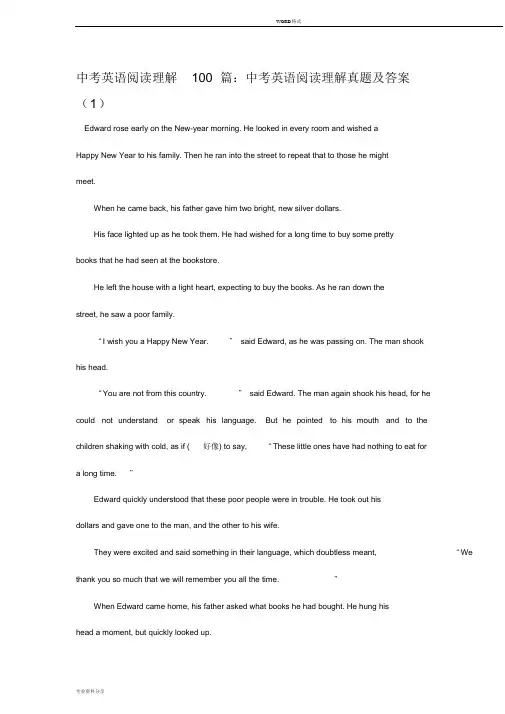
中考英语阅读理解100 篇:中考英语阅读理解真题及答案(1)Edward rose early on the New-year morning. He looked in every room and wished aHappy New Year to his family. Then he ran into the street to repeat that to those he mightmeet.When he came back, his father gave him two bright, new silver dollars.His face lighted up as he took them. He had wished for a long time to buy some prettybooks that he had seen at the bookstore.He left the house with a light heart, expecting to buy the books. As he ran down thestreet, he saw a poor family.“I wish you a Happy New Year. ”said Edward, as he was passing on. The man shookhis head.“You are not from this country. ”said Edward. The man again shook his head, for hecould not understand or speak his language. But he pointed to his mouth and to thechildren shaking with cold, as if ( 好像) to say, “These little ones have had nothing to eat fora long time. ”Edward quickly understood that these poor people were in trouble. He took out hisdollars and gave one to the man, and the other to his wife.They were excited and said something in their language, which doubtless meant, “We thank you so much that we will remember you all the time. ”When Edward came home, his father asked what books he had bought. He hung hishead a moment, but quickly looked up.“Ihave bought no books”,said he. “Igave my money to some poor people, who seemed to be very hungry then. ”He went on, “I think I can wait for my books till next New Year. ”“My dear boy, ”said his father, “here are s o m f e o r b o y o u k s,more as a prize for your goodness of heart than as a New- year gift ”“I saw you give the money cheerfully to the poor German family. It was nice for a littleboy to do so. Be always ready to help others and every year of your life will be to you aHappy New Year. ”48. Edward expected to _________ with the money he got from his father.A. help the poor familyB. buy something to eatC. buy some pretty booksD. learn another language49. Why did the poor man shake his head when Edward spoke to him?A. He couldn ’t understand the boyB. He wouldn ’t accept the moneyC. He didn ’t like the boy ’s languageD. He was too cold to say anything50. How much did Edward give the poor family?A. One dollarB. Two dollarsC. Three dollarsD. Four dollars51. We know that Edward_________ from the passage?A. got a prize for his kind heartB. had to buy his books next yearC. bought the books at the bookstoreD. got more money from his father【参考答案】:48-51 CABA【语篇解读】:本篇是一个记叙文。
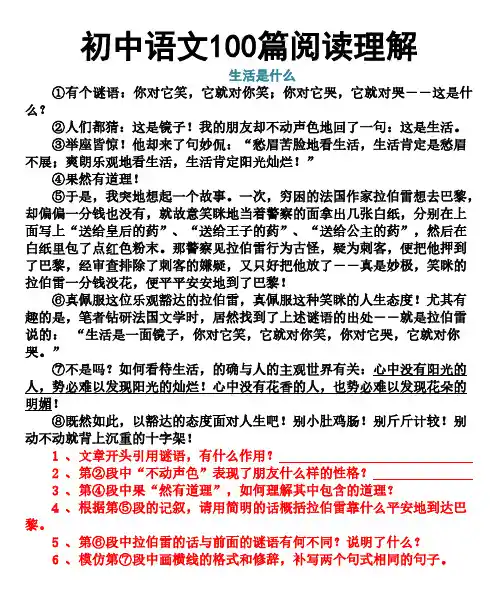
初中语文100篇阅读理解生活是什么①有个谜语:你对它笑,它就对你笑;你对它哭,它就对哭--这是什么?②人们都猜:这是镜子!我的朋友却不动声色地回了一句:这是生活。
③举座皆惊!他却来了句妙侃:“愁眉苦脸地看生活,生活肯定是愁眉不展;爽朗乐观地看生活,生活肯定阳光灿烂!”④果然有道理!⑤于是,我突地想起一个故事。
一次,穷困的法国作家拉伯雷想去巴黎,却偏偏一分钱也没有,就故意笑眯地当着警察的面拿出几张白纸,分别在上面写上“送给皇后的药”、“送给王子的药”、“送给公主的药”,然后在白纸里包了点红色粉末。
那警察见拉伯雷行为古怪,疑为刺客,便把他押到了巴黎,经审查排除了刺客的嫌疑,又只好把他放了--真是妙极,笑眯的拉伯雷一分钱没花,便平平安安地到了巴黎!⑥真佩服这位乐观豁达的拉伯雷,真佩服这种笑眯的人生态度!尤其有趣的是,笔者钻研法国文学时,居然找到了上述谜语的出处--就是拉伯雷说的:“生活是一面镜子,你对它笑,它就对你笑,你对它哭,它就对你哭。
”⑦不是吗?如何看待生活,的确与人的主观世界有关:心中没有阳光的人,势必难以发现阳光的灿烂!心中没有花香的人,也势必难以发现花朵的明媚!⑧既然如此,以豁达的态度面对人生吧!别小肚鸡肠!别斤斤计较!别动不动就背上沉重的十字架!1、文章开头引用谜语,有什么作用?2、第②段中“不动声色”表现了朋友什么样的性格?3、第④段中果“然有道理”,如何理解其中包含的道理?4、根据第⑤段的记叙,请用简明的话概括拉伯雷靠什么平安地到达巴黎。
5、第⑥段中拉伯雷的话与前面的谜语有何不同?说明了什么?6、模仿第⑦段中画横线的格式和修辞,补写两个句式相同的句子。
7、最后一段连用几个感叹号,有什么作用?8、读了本文,你认为生活还是什么?请运用比喻对它进行描摹。
地平线小的时候,我才从秦岭来到渭北大平原,最喜欢骑上自行车在路上无拘无束地奔驰。
庄稼收割了,又没有多少行人,空旷的原野上稀落着一些树丛和矮矮的屋。
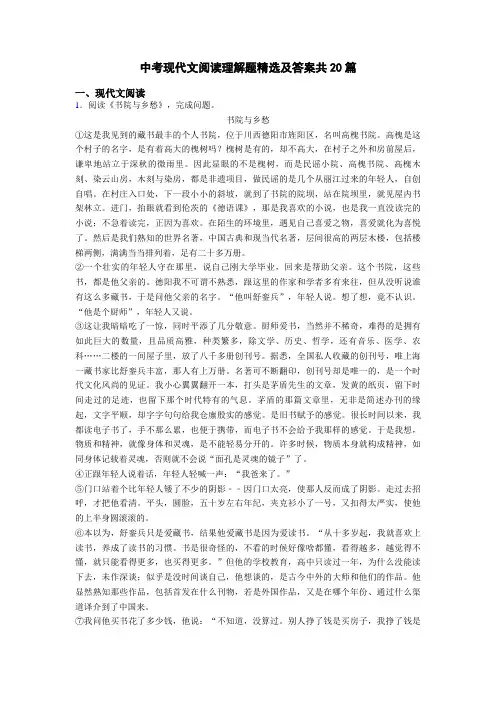
中考现代文阅读理解题精选及答案共20篇一、现代文阅读1.阅读《书院与乡愁》,完成问题。
书院与乡愁①这是我见到的藏书最丰的个人书院,位于川西德阳市旌阳区,名叫高槐书院。
高槐是这个村子的名字,是有着高大的槐树吗?槐树是有的,却不高大,在村子之外和房前屋后,谦卑地站立于深秋的微雨里。
因此显眼的不是槐树,而是民谣小院、高槐书院、高槐木刻、染云山房,木刻与染房,都是非遗项目,做民谣的是几个从丽江过来的年轻人,自创自唱。
在村庄入口处,下一段小小的斜坡,就到了书院的院坝,站在院坝里,就见屋内书架林立。
进门,抬眼就看到伦茨的《德语课》,那是我喜欢的小说,也是我一直没读完的小说;不急着读完,正因为喜欢。
在陌生的环境里,遇见自己喜爱之物,喜爱就化为喜悦了。
然后是我们熟知的世界名著,中国古典和现当代名著,层间很高的两层木楼,包括楼梯两侧,满满当当排列着,足有二十多万册。
②一个壮实的年轻人守在那里,说自己刚大学毕业,回来是帮助父亲。
这个书院,这些书,都是他父亲的。
德阳我不可谓不熟悉,跟这里的作家和学者多有来往,但从没听说谁有这么多藏书,于是问他父亲的名字。
“他叫舒銮兵”,年轻人说。
想了想,竟不认识。
“他是个厨师”,年轻人又说。
③这让我暗暗吃了一惊,同时平添了几分敬意。
厨师爱书,当然并不稀奇,难得的是拥有如此巨大的数量,且品质高雅,种类繁多,除文学、历史、哲学,还有音乐、医学、农科……二楼的一间屋子里,放了八千多册创刊号。
据悉,全国私人收藏的创刊号,唯上海一藏书家比舒銮兵丰富,那人有上万册。
名著可不断翻印,创刊号却是唯一的,是一个时代文化风尚的见证。
我小心翼翼翻开一本,打头是茅盾先生的文章,发黄的纸页,留下时间走过的足迹,也留下那个时代特有的气息。
茅盾的那篇文章里,无非是简述办刊的缘起,文字平顺,却字字句句给我仓廪殷实的感觉。
是旧书赋予的感觉。
很长时间以来,我都读电子书了,手不那么累,也便于携带,而电子书不会给予我那样的感觉。
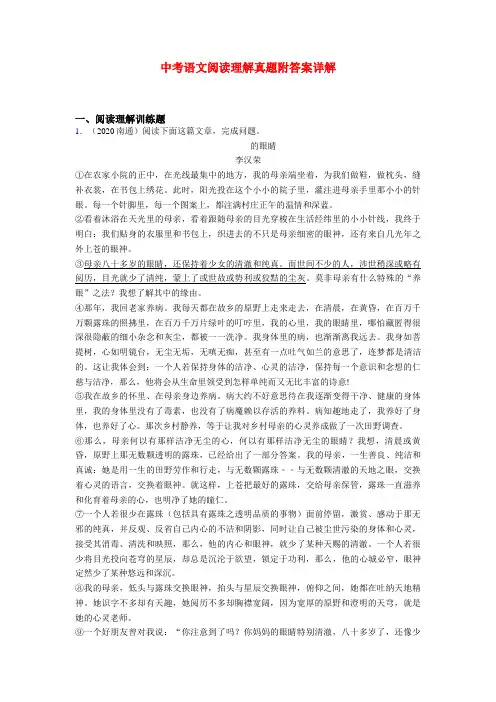
中考语文阅读理解真题附答案详解一、阅读理解训练题1.(2020南通)阅读下面这篇文章,完成问题。
______的眼睛李汉荣①在农家小院的正中,在光线最集中的地方,我的母亲端坐着,为我们做鞋,做枕头,缝补衣裳,在书包上绣花。
此时,阳光投在这个小小的院子里,灌注进母亲手里那小小的针眼。
每一个针脚里,每一个图案上,都注满村庄正午的温情和深蓝。
②看着沐浴在天光里的母亲,看着跟随母亲的目光穿梭在生活经纬里的小小针线,我终于明白:我们贴身的衣服里和书包上,织进去的不只是母亲细密的眼神,还有来自几光年之外上苍的眼神。
③母亲八十多岁的眼睛,还保持着少女的清澈和纯真。
而世间不少的人,涉世稍深或略有阅历,目光就少了清纯,蒙上了或世故或势利或狡黠的尘灰。
莫非母亲有什么特殊的“养眼”之法?我想了解其中的缘由。
④那年,我回老家养病。
我每天都在故乡的原野上走来走去,在清晨,在黄昏,在百万千万颗露珠的照拂里,在百万千万片绿叶的叮咛里,我的心里,我的眼睛里,哪怕藏匿得很深很隐蔽的细小杂念和灰尘,都被一一洗净。
我身体里的病,也渐渐离我远去。
我身如菩提树,心如明镜台,无尘无垢,无嗔无痴,甚至有一点吐气如兰的意思了,连梦都是清洁的。
这让我体会到:一个人若保持身体的洁净、心灵的洁净,保持每一个意识和念想的仁慈与洁净,那么,他将会从生命里领受到怎样单纯而又无比丰富的诗意!⑤我在故乡的怀里、在母亲身边养病。
病大约不好意思待在我逐渐变得干净、健康的身体里,我的身体里没有了毒素,也没有了病魔赖以存活的养料。
病知趣地走了,我养好了身体,也养好了心。
那次乡村静养,等于让我对乡村母亲的心灵养成做了一次田野调查。
⑥那么,母亲何以有那样洁净无尘的心,何以有那样洁净无尘的眼睛?我想,清晨或黄昏,原野上那无数颗透明的露珠,已经给出了一部分答案。
我的母亲,一生善良、纯洁和真诚:她是用一生的田野劳作和行走,与无数颗露珠﹣﹣与无数颗清澈的天地之眼,交换着心灵的语言,交换着眼神。
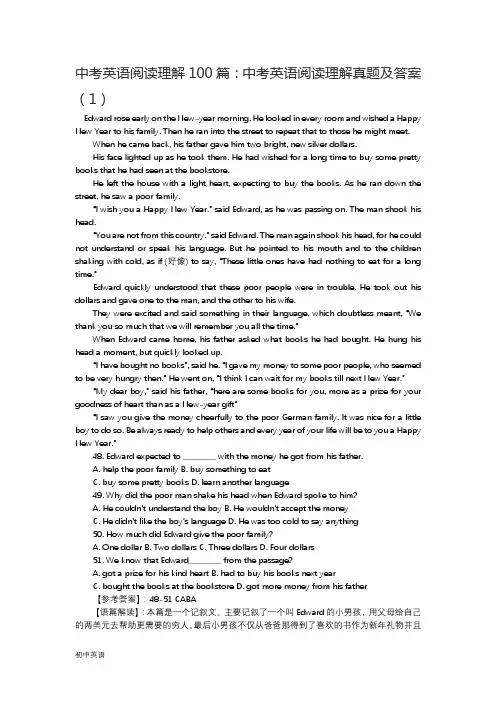
中考英语阅读理解100篇:中考英语阅读理解真题及答案(1)Edward rose early on the New-year morning. He looked in every room and wished a Happy New Year to his family. Then he ran into the street to repeat that to those he might meet.When he came back, his father gave him two bright, new silver dollars.His face lighted up as he took them. He had wished for a long time to buy some pretty books that he had seen at the bookstore.He left the house with a light heart, expecting to buy the books. As he ran down the street, he saw a poor family.“I wish you a Happy New Year.” said Edward, as he was passing on. The man shook his head.“You are not from this country.” said Edward. The man again shook his head, for he could not understand or speak his language. But he pointed to his mouth and to the children shaking with cold, as if (好像) to say, “These little ones have had nothing to eat for a long time.”Edward quickly understood that these poor people were in trouble. He took out his dollars and gave one to the man, and the other to his wife.They were excited and said something in their language, which doubtless meant, “We thank you so much that we will remember you all the time.”When Edward came home, his father asked what books he had bought. He hung his head a moment, but quickly looked up.“I have bought no books”, said he. “I gave my money to some poor people, who seemed to be very hungry then.” He went on, “I think I can wait for my books till next New Year.”“My dear boy,” said his father, “here are some books for you, more as a prize for your goodness of heart than as a New-year gift”“I saw you give the money cheerfully to the poor German family. It was nice for a little boy to do so. Be always ready to help others and every year of your life will be to you a Happy New Year.”48. Edward expected to _________ with the money he got from his father.A. help the poor familyB. buy something to eatC. buy some pretty booksD. learn another language49. Why did the poor man shake his head when Edward spoke to him?A. He couldn’t understand the boyB. He wouldn’t accept the moneyC. He didn’t like the boy’s languageD. He was too cold to say anything50. How much did Edward give the poor family?A. One dollarB. Two dollarsC. Three dollarsD. Four dollars51. We know that Edward_________ from the passage?A. got a prize for his kind heartB. had to buy his books next yearC. bought the books at the bookstoreD. got more money from his father【参考答案】:48-51 CABA【语篇解读】:本篇是一个记叙文。
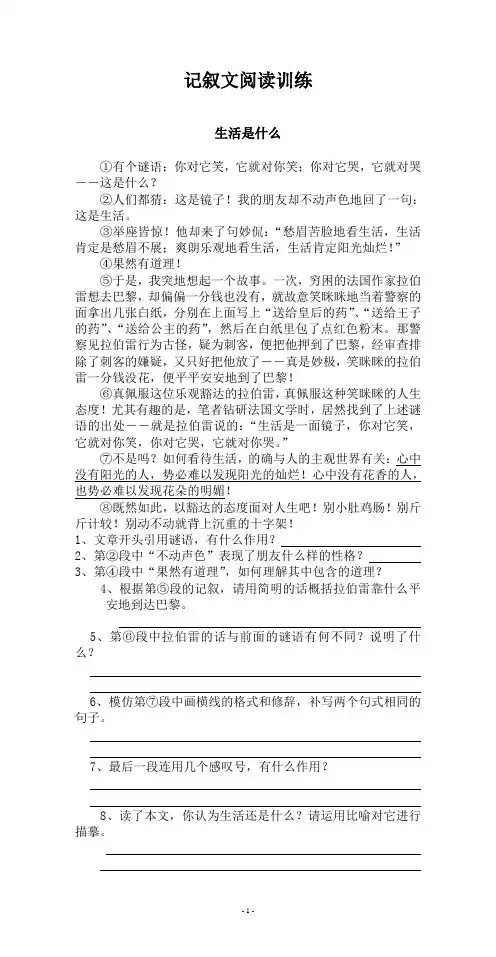
记叙文阅读训练生活是什么①有个谜语:你对它笑,它就对你笑;你对它哭,它就对哭--这是什么?②人们都猜:这是镜子!我的朋友却不动声色地回了一句:这是生活。
③举座皆惊!他却来了句妙侃:“愁眉苦脸地看生活,生活肯定是愁眉不展;爽朗乐观地看生活,生活肯定阳光灿烂!”④果然有道理!⑤于是,我突地想起一个故事。
一次,穷困的法国作家拉伯雷想去巴黎,却偏偏一分钱也没有,就故意笑眯眯地当着警察的面拿出几张白纸,分别在上面写上“送给皇后的药”、“送给王子的药”、“送给公主的药”,然后在白纸里包了点红色粉末。
那警察见拉伯雷行为古怪,疑为刺客,便把他押到了巴黎,经审查排除了刺客的嫌疑,又只好把他放了--真是妙极,笑眯眯的拉伯雷一分钱没花,便平平安安地到了巴黎!⑥真佩服这位乐观豁达的拉伯雷,真佩服这种笑眯眯的人生态度!尤其有趣的是,笔者钻研法国文学时,居然找到了上述谜语的出处--就是拉伯雷说的:“生活是一面镜子,你对它笑,它就对你笑,你对它哭,它就对你哭。
”⑦不是吗?如何看待生活,的确与人的主观世界有关:心中没有阳光的人,势必难以发现阳光的灿烂!心中没有花香的人,也势必难以发现花朵的明媚!⑧既然如此,以豁达的态度面对人生吧!别小肚鸡肠!别斤斤计较!别动不动就背上沉重的十字架!1、文章开头引用谜语,有什么作用?2、第②段中“不动声色”表现了朋友什么样的性格?3、第④段中“果然有道理”,如何理解其中包含的道理?4、根据第⑤段的记叙,请用简明的话概括拉伯雷靠什么平安地到达巴黎。
5、第⑥段中拉伯雷的话与前面的谜语有何不同?说明了什么?6、模仿第⑦段中画横线的格式和修辞,补写两个句式相同的句子。
7、最后一段连用几个感叹号,有什么作用?8、读了本文,你认为生活还是什么?请运用比喻对它进行描摹。
地平线小的时候,我才从秦岭来到渭北大平原,最喜欢骑上自行车在路上无拘无束地奔驰。
庄稼收割了,又没有多少行人,空旷的原野上稀落着一些树丛和矮矮的屋。
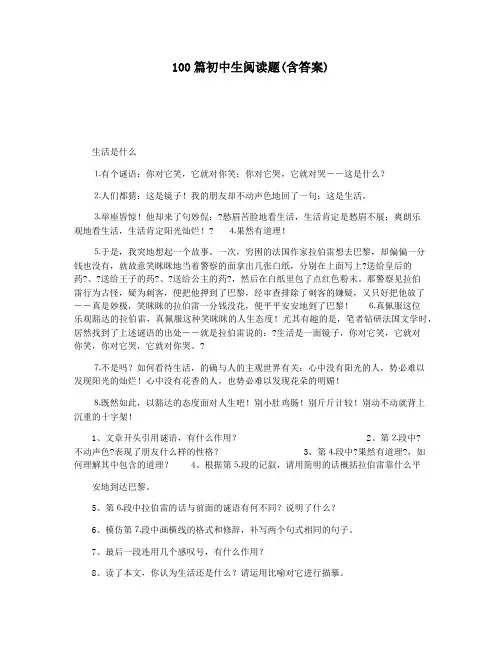
100篇初中生阅读题(含答案)生活是什么⒈有个谜语:你对它笑,它就对你笑;你对它哭,它就对哭--这是什么?⒉人们都猜:这是镜子!我的朋友却不动声色地回了一句:这是生活。
⒊举座皆惊!他却来了句妙侃:?愁眉苦脸地看生活,生活肯定是愁眉不展;爽朗乐观地看生活,生活肯定阳光灿烂!? ⒋果然有道理!⒌于是,我突地想起一个故事。
一次,穷困的法国作家拉伯雷想去巴黎,却偏偏一分钱也没有,就故意笑眯眯地当着警察的面拿出几张白纸,分别在上面写上?送给皇后的药?、?送给王子的药?、?送给公主的药?,然后在白纸里包了点红色粉末。
那警察见拉伯雷行为古怪,疑为刺客,便把他押到了巴黎,经审查排除了刺客的嫌疑,又只好把他放了--真是妙极,笑眯眯的拉伯雷一分钱没花,便平平安安地到了巴黎!⒍真佩服这位乐观豁达的拉伯雷,真佩服这种笑眯眯的人生态度!尤其有趣的是,笔者钻研法国文学时,居然找到了上述谜语的出处--就是拉伯雷说的:?生活是一面镜子,你对它笑,它就对你笑,你对它哭,它就对你哭。
?⒎不是吗?如何看待生活,的确与人的主观世界有关:心中没有阳光的人,势必难以发现阳光的灿烂!心中没有花香的人,也势必难以发现花朵的明媚!⒏既然如此,以豁达的态度面对人生吧!别小肚鸡肠!别斤斤计较!别动不动就背上沉重的十字架!1、文章开头引用谜语,有什么作用?2、第⒉段中?不动声色?表现了朋友什么样的性格? 3、第⒋段中?果然有道理?,如何理解其中包含的道理? 4、根据第⒌段的记叙,请用简明的话概括拉伯雷靠什么平安地到达巴黎。
5、第⒍段中拉伯雷的话与前面的谜语有何不同?说明了什么?6、模仿第⒎段中画横线的格式和修辞,补写两个句式相同的句子。
7、最后一段连用几个感叹号,有什么作用?8、读了本文,你认为生活还是什么?请运用比喻对它进行描摹。
- 1 -地平线小的时候,我才从秦岭来到渭北大平原,最喜欢骑上自行车在路上无拘无束地奔驰。
庄稼收割了,又没有多少行人,空旷的原野上稀落着一些树丛和矮矮的屋。
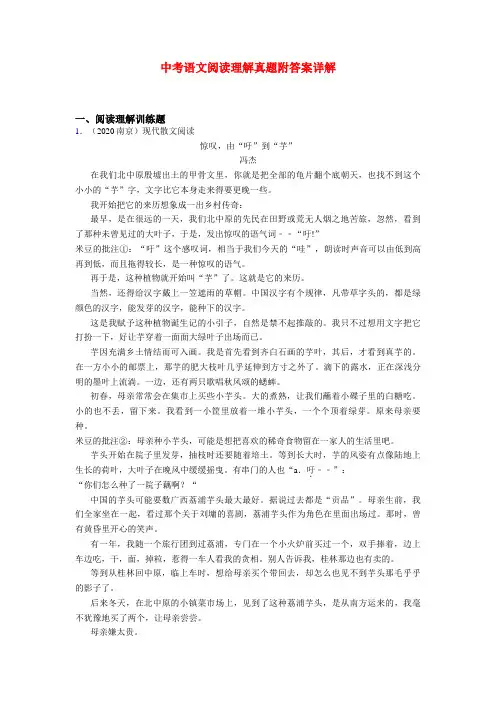
中考语文阅读理解真题附答案详解一、阅读理解训练题1.(2020南京)现代散文阅读惊叹,由“吁”到“芋”冯杰在我们北中原殷墟出土的甲骨文里,你就是把全部的龟片翻个底朝天,也找不到这个小小的“芋”字,文字比它本身走来得要更晚一些。
我开始把它的来历想象成一出乡村传奇:最早,是在很远的一天,我们北中原的先民在田野或荒无人烟之地苦旅,忽然,看到了那种未曾见过的大叶子,于是,发出惊叹的语气词﹣﹣“吁.!”米豆的批注①:“吁”这个感叹词,相当于我们今天的“哇”,朗读时声音可以由低到高再到低,而且拖得较长,是一种惊叹的语气。
再于是,这种植物就开始叫“芋”了。
这就是它的来历。
当然,还得给汉字戴上一笠遮雨的草帽。
中国汉字有个规律,凡带草字头的,都是绿颜色的汉字,能发芽的汉字,能种下的汉字。
这是我赋予这种植物诞生记的小引子,自然是禁不起推敲的。
我只不过想用文字把它打扮一下,好让芋穿着一面面大绿叶子出场而已。
芋因充满乡土情结而可入画。
我是首先看到齐白石画的芋叶,其后,才看到真芋的。
在一方小小的邮票上,那芋的肥大枝叶几乎延伸到方寸之外了。
滴下的露水,正在深浅分明的墨叶上流淌。
一边,还有两只歌唱秋风颂的蟋蟀。
初春,母亲常常会在集市上买些小芋头。
大的煮熟,让我们蘸着小碟子里的白糖吃。
小的也不丢,留下来。
我看到一小筐里放着一堆小芋头,一个个顶着绿芽。
原来母亲要种。
米豆的批注②:母亲种小芋头,可能是想把喜欢的稀奇食物留在一家人的生活里吧。
芋头开始在院子里发芽,抽枝时还要随着培土。
等到长大时,芋的风姿有点像陆地上生长的荷叶,大叶子在晚风中缓缓摇曳。
有串门的人也“a.吁.﹣﹣”:“你们怎么种了一院子藕啊?“中国的芋头可能要数广西荔浦芋头最大最好。
据说过去都是“贡品”。
母亲生前,我们全家坐在一起,看过那个关于刘墉的喜剧,荔浦芋头作为角色在里面出场过。
那时,曾有黄昏里开心的笑声。
有一年,我随一个旅行团到过荔浦,专门在一个小火炉前买过一个,双手捧着,边上车边吃,干,面,掉粒,惹得一车人看我的贪相。
记叙文阅读训练生活是什么①有个谜语:你对它笑,它就对你笑;你对它哭,它就对哭--这是什么?②人们都猜:这是镜子!我的朋友却不动声色地回了一句:这是生活。
③举座皆惊!他却来了句妙侃:“愁眉苦脸地看生活,生活肯定是愁眉不展;爽朗乐观地看生活,生活肯定阳光灿烂!”④果然有道理!⑤于是,我突地想起一个故事。
一次,穷困的法国作家拉伯雷想去巴黎,却偏偏一分钱也没有,就故意笑眯眯地当着警察的面拿出几张白纸,分别在上面写上“送给皇后的药”、“送给王子的药”、“送给公主的药”,然后在白纸里包了点红色粉末。
那警察见拉伯雷行为古怪,疑为刺客,便把他押到了巴黎,经审查排除了刺客的嫌疑,又只好把他放了--真是妙极,笑眯眯的拉伯雷一分钱没花,便平平安安地到了巴黎!⑥真佩服这位乐观豁达的拉伯雷,真佩服这种笑眯眯的人生态度!尤其有趣的是,笔者钻研法国文学时,居然找到了上述谜语的出处--就是拉伯雷说的:“生活是一面镜子,你对它笑,它就对你笑,你对它哭,它就对你哭。
”⑦不是吗?如何看待生活,的确与人的主观世界有关:心中没有阳光的人,势必难以发现阳光的灿烂!心中没有花香的人,也势必难以发现花朵的明媚!⑧既然如此,以豁达的态度面对人生吧!别小肚鸡肠!别斤斤计较!别动不动就背上沉重的十字架!1、文章开头引用谜语,有什么作用?2、第②段中“不动声色”表现了朋友什么样的性格?3、第④段中“果然有道理”,如何理解其中包含的道理?4、根据第⑤段的记叙,请用简明的话概括拉伯雷靠什么平安地到达巴黎。
5、第⑥段中拉伯雷的话与前面的谜语有何不同?说明了什么?6、模仿第⑦段中画横线的格式和修辞,补写两个句式相同的句子。
7、最后一段连用几个感叹号,有什么作用?8、读了本文,你认为生活还是什么?请运用比喻对它进行描摹。
地平线小的时候,我才从秦岭来到渭北大平原,最喜欢骑上自行车在路上无拘无束地奔驰。
庄稼收割了,又没有多少行人,空旷的原野上稀落着一些树丛和矮矮的屋。
记叙文阅读训练生活是什么①有个谜语:你对它笑,它就对你笑;你对它哭,它就对哭--这是什么?②人们都猜:这是镜子!我的朋友却不动声色地回了一句:这是生活。
③举座皆惊!他却来了句妙侃:“愁眉苦脸地看生活,生活肯定是愁眉不展;爽朗乐观地看生活,生活肯定阳光灿烂!”④果然有道理!⑤于是,我突地想起一个故事。
一次,穷困的法国作家拉伯雷想去巴黎,却偏偏一分钱也没有,就故意笑眯眯地当着警察的面拿出几张白纸,分别在上面写上“送给皇后的药”、“送给王子的药”、“送给公主的药”,然后在白纸里包了点红色粉末。
那警察见拉伯雷行为古怪,疑为刺客,便把他押到了巴黎,经审查排除了刺客的嫌疑,又只好把他放了--真是妙极,笑眯眯的拉伯雷一分钱没花,便平平安安地到了巴黎!⑥真佩服这位乐观豁达的拉伯雷,真佩服这种笑眯眯的人生态度!尤其有趣的是,笔者钻研法国文学时,居然找到了上述谜语的出处--就是拉伯雷说的:“生活是一面镜子,你对它笑,它就对你笑,你对它哭,它就对你哭。
”⑦不是吗?如何看待生活,的确与人的主观世界有关:心中没有阳光的人,势必难以发现阳光的灿烂!心中没有花香的人,也势必难以发现花朵的明媚!⑧既然如此,以豁达的态度面对人生吧!别小肚鸡肠!别斤斤计较!别动不动就背上沉重的十字架!1、文章开头引用谜语,有什么作用?2、第②段中“不动声色”表现了朋友什么样的性格?3、第④段中“果然有道理”,如何理解其中包含的道理?4、根据第⑤段的记叙,请用简明的话概括拉伯雷靠什么平安地到达巴黎。
5、第⑥段中拉伯雷的话与前面的谜语有何不同?说明了什么?6、模仿第⑦段中画横线的格式和修辞,补写两个句式相同的句子。
7、最后一段连用几个感叹号,有什么作用?8、读了本文,你认为生活还是什么?请运用比喻对它进行描摹。
地平线小的时候,我才从秦岭来到渭北大平原,最喜欢骑上自行车在路上无拘无束地奔驰。
庄稼收割了,又没有多少行人,空旷的原野上稀落着一些树丛和矮矮的屋。
答案】初中语文阅读理解必备100篇(一)一、我梳着仕女发型,顶着满头菊花跑出家,惹得村人围观。
我周日买回一盆黄色的菊花,勾起了我对孩提时的美好回忆和对美的追求,驱散了秋天的寒意,让心灵一片温暖。
我喜爱和赞美菊花的情感已不言而喻。
二、父亲希望我长大有出息,能够跳出穷山村,展翅飞翔。
但因为名字的缘故,我不能和小伙伴们一起玩儿,感到孤独。
在接到大学录取通知书的那天,我为自己终于可以脱离父亲的管制,实现不想见到他的梦想而哭。
对父亲大办酒席时的高兴劲儿,我不屑一顾。
在冲出家门的时候,我也不顾及父亲的黯然神伤。
前两年在省城念书,我没有回过一次家,没有认真给父亲写过一封信。
三、作者运用拟人、比喻的手法,生动形象地写出野菊花开放的姿态,表现它“随意又随性”,表达了作者对它的喜爱和赞美,同时表现了父亲对“我”就要离开家乡时恋恋不舍的心理活动,以及对“我”独立生活担心的心理活动。
四、一开始我对父亲的迷信举动嗤之以鼻,甚至愤然。
但当父亲竟然能够写出我的名字时,我的灵魂被深深地灼痛了,苏醒了。
我从父亲的这个举动中感受到了他沉重的爱,并开始忏悔自己。
最后,黄色的菊花勾起了我对美好回忆和对美的追求,让心灵一片温暖。
我对菊花的喜爱和赞美已不言而喻。
五、神山赶庙会时,我先是只顾脱模子,后在看摔跤时一直挎着一篮脱好的模子未放下。
东古城捕鸟时,我偶然发现上好的黄土后独自秘密挖黄土,如获至宝。
2.本段文字展现了祖母对“我”的偏爱,同时也表现了“我”对脱模子、捏泥塑等手工艺的热爱和珍视。
此外,本段与文章第一段相呼应,进一步加深了文章的主题,使文章的结构更加连贯自然。
注:本段分数标准为内容和结构各1分,祖母的偏爱和手工艺的表现分别为0.5分。
3.答案示例:这句话将泥土比作“花瓣”,生动地描绘了泥土片状微卷的形态。
同时,“快活”和“绽”这些词不仅赋予了泥土生命的活力,还表达了“我”得到这块好土时的喜悦之情。
注:赏析句子应从字词、修辞和主旨三个方面入手,语言通顺流畅即可。
记叙文阅读训练生活是什么①有个谜语:你对它笑,它就对你笑;你对它哭,它就对哭--这是什么?②人们都猜:这是镜子!我的朋友却不动声色地回了一句:这是生活。
③举座皆惊!他却来了句妙侃:“愁眉苦脸地看生活,生活肯定是愁眉不展;爽朗乐观地看生活,生活肯定阳光灿烂!”④果然有道理!⑤于是,我突地想起一个故事。
一次,穷困的法国作家拉伯雷想去巴黎,却偏偏一分钱也没有,就故意笑眯眯地当着警察的面拿出几张白纸,分别在上面写上“送给皇后的药”、“送给王子的药”、“送给公主的药”,然后在白纸里包了点红色粉末。
那警察见拉伯雷行为古怪,疑为刺客,便把他押到了巴黎,经审查排除了刺客的嫌疑,又只好把他放了--真是妙极,笑眯眯的拉伯雷一分钱没花,便平平安安地到了巴黎!⑥真佩服这位乐观豁达的拉伯雷,真佩服这种笑眯眯的人生态度!尤其有趣的是,笔者钻研法国文学时,居然找到了上述谜语的出处--就是拉伯雷说的:“生活是一面镜子,你对它笑,它就对你笑,你对它哭,它就对你哭。
”⑦不是吗?如何看待生活,的确与人的主观世界有关:心中没有阳光的人,势必难以发现阳光的灿烂!心中没有花香的人,也势必难以发现花朵的明媚!⑧既然如此,以豁达的态度面对人生吧!别小肚鸡肠!别斤斤计较!别动不动就背上沉重的十字架!1、文章开头引用谜语,有什么作用?2、第②段中“不动声色”表现了朋友什么样的性格?3、第④段中“果然有道理”,如何理解其中包含的道理?4、根据第⑤段的记叙,请用简明的话概括拉伯雷靠什么平安地到达巴黎。
5、第⑥段中拉伯雷的话与前面的谜语有何不同?说明了什么?6、模仿第⑦段中画横线的格式和修辞,补写两个句式相同的句子。
7、最后一段连用几个感叹号,有什么作用?8、读了本文,你认为生活还是什么?请运用比喻对它进行描摹。
地平线小的时候,我才从秦岭来到渭北大平原,最喜欢骑上自行车在路上无拘无束地奔驰。
庄稼收割了,又没有多少行人,空旷的原野上稀落着一些树丛和矮矮的屋。
中考语文阅读理解真题附答案详解一、阅读理解训练题1.(2020苏州)阅读下面的文章,完成各题。
草原日出[英]多丽丝•莱辛①那年冬天,每晚睡前,他都对着枕头里面大声喊:“四点半!四点半!”直到确信脑袋已抓牢这三个字,才安然入睡,仿佛一片安眠药突然降临。
他脸朝着闹钟的方向,这样醒来后第一眼便能看到它。
②早晨四点半,分秒不差,他得意地按下将要响起的闹铃。
再躺这最后一秒吧!不,他弹跳而起,如鱼跃水面。
冷啊!真冷啊!③出门,带上猎枪和狗。
天亮前他得赶完四里路。
他在疾行,狗在探路。
它们没有经过训练,自由散漫,有时会玩失踪,但却是他最好的同伴。
为了几枪射击,他要赶很长的路,有了它们路上就不枯燥了。
④他在田埂上跑起来,大步慢跑,扎实前进。
这方法是他观察土著人学会的:上身的重量交替落在两脚上,保持慢速、平衡运动,这样不会疲乏气短。
当血液从腿部冲上胳膊,他对身体的得意和骄傲油然而生,直到他不得不咬紧牙关,关住那股想大声歌唱的强烈欲望。
⑤草原。
第一只鸟在他脚边醒来,接着一群鸟冲向天空,鸣叫着宣布新一天的开始。
他终于抑制不住,发出狂野的喊叫,然后野兽似的狂奔,他在疯狂中忘我地歌唱生命的愉悦和青春的奢华。
⑥突然,他想起了什么:我15岁啦!15岁啦!这话对他来说很新鲜,他满怀兴奋又若有所思,开始用手指感受走过的岁月,像数着鹅卵石,每一块既独立又离不开彼此,每一块都闪烁着奇异的光芒。
这就是他:在这片土地上生长了十五年的男孩。
陪伴他的有这缓缓的河水,还有这充满挑战的空气:夏日正午,它闷热难耐;冬天早晨,它凛冽刺骨。
⑦没有什么他不能做到!他觉得自己将来的生命是伟大而神奇的,完全是他自己的:“世上所有大人物都曾像我现在这样小,所以我也能成为大人物。
只要我愿意,我能把世界变成我想要的样子。
”⑧他的嗓音充满了紧迫性、真理性和非凡的勇气。
他又大声唱起来,歌声沿着河水旁的峡谷回荡,他停下来等待回声,然后又唱:“歌唱吧!这就是他﹣﹣只要愿意,他就歌唱,这个世界必须响应他!”⑨他等待回声。
生活是什么①有个谜语:你对它笑,它就对你笑;你对它哭,它就对哭--这是什么?②人们都猜:这是镜子!我的朋友却不动声色地回了一句:这是生活。
③举座皆惊!他却来了句妙侃:“愁眉苦脸地看生活,生活肯定是愁眉不展;爽朗乐观地看生活,生活肯定阳光灿烂!”④果然有道理!⑤于是,我突地想起一个故事。
一次,穷困的法国作家拉伯雷想去巴黎,却偏偏一分钱也没有,就故意笑眯眯地当着警察的面拿出几张白纸,分别在上面写上“送给皇后的药”、“送给王子的药”、“送给公主的药”,然后在白纸里包了点红色粉末。
那警察见拉伯雷行为古怪,疑为刺客,便把他押到了巴黎,经审查排除了刺客的嫌疑,又只好把他放了--真是妙极,笑眯眯的拉伯雷一分钱没花,便平平安安地到了巴黎!⑥真佩服这位乐观豁达的拉伯雷,真佩服这种笑眯眯的人生态度!尤其有趣的是,笔者钻研法国文学时,居然找到了上述谜语的出处--就是拉伯雷说的:“生活是一面镜子,你对它笑,它就对你笑,你对它哭,它就对你哭。
”⑦不是吗?如何看待生活,的确与人的主观世界有关:心中没有阳光的人,势必难以发现阳光的灿烂!心中没有花香的人,也势必难以发现花朵的明媚!⑧既然如此,以豁达的态度面对人生吧!别小肚鸡肠!别斤斤计较!别动不动就背上沉重的十字架!1、文章开头引用谜语,有什么作用?2、第②段中“不动声色”表现了朋友什么样的性格?3、第④段中“果然有道理”,如何理解其中包含的道理?4、根据第⑤段的记叙,请用简明的话概括拉伯雷靠什么平安地到达巴黎。
5、第⑥段中拉伯雷的话与前面的谜语有何不同?说明了什么?6、模仿第⑦段中画横线的格式和修辞,补写两个句式相同的句子。
7、最后一段连用几个感叹号,有什么作用?8、读了本文,你认为生活还是什么?请运用比喻对它进行描摹。
地平线小的时候,我才从秦岭来到渭北大平原,最喜欢骑上自行车在路上无拘无束地奔驰。
庄稼收割了,又没有多少行人,空旷的原野上稀落着一些树丛和矮矮的屋。
差不多一抬头,就看见远远的地方,天和地已经不再平行。
精选中考阅读理解100篇(附答案)(1-20)1-20(1) The Weather (选自广州)In winter the weather in England is often very cold. In spring and autumn there are sometimes cold days, but there are also days when the weather is warm. The weather is usually warm insummer. It is sometimes hot in summer, but it is not often very hot. There are often cool daysin summer.When the temperature is over 27℃, English people say it is hot. When the temperature is about 21℃, they say it is warm.In the north of Europe it is very cold in winter. In the south of Europe the summer is often very hot.In the south of Spain(1) and in North Africa(2) the summer is always hot.Water freezes(3) at 0℃. When water freezes, it changes from a liquid(4) into ice. Water boils (5) at 100℃. When water boils, it changes from a liquid into steam(6).Notes: (1)Spain/speIn/n. 西班牙(2)Africa/`frIk/n.非洲(3)freeze/fri:z/v.结冰(4)liquid/`lIkwId/n.液体(5)boil/bIl/v.沸腾;(水)开(6)steam/sti:m/ n.蒸汽1.What is the weather like in summer in England?A.V ery hot.B.Warm.C.Cool.D.Both A and C.2.What do you think “the north of Europe" means?A.A part of a country.B.The capital of Europe.C.A country in the north of Europe.D.A part of Europe.3.When water freezes, it changes from into.A.water, iceB.water, steamC.steam, iceD.ice, water4.The writer wants to tell us something about.A.the weather in EuropeB.the weather in EnglandC.some knowledge of the temperatureD. three states of water答案:1—4 DDAC(2) The Artist and the Beggar(1)(选自成都)An artist was coming home by train one day. He hadn’t much money but was very kind. He gave his last few coins(2) to a beggar, but he saw another one, and forgot that he didn’t have any money in his pockets. He asked the man if he liked to have lunch with him, and the beggar, of course, agreed. So they went into a small restaurant and had a good meal.In the end, the artist could not pay the bill(3), and the beggar had to do so. The artist felt very sorry for it, so he said to the beggar, “Come home with me in a taxi, my friend. And I’ll give you the money for our lunch."“Oh, no!" the beggar answered quickly. “I had to pay for your lunch, but I‟m not going to pay for your taxi home!"Notes: (1)beggar/`beg/ n.乞丐(2)coin/kIn/n. 硬币(3)bill /bIl/n.帐单1.What kind of man was the artist?2.What did he do to the first beggar?3.What did the artist forget when he invited another beggar to have lunch with him?4.Who paid for the meal?5.What did the artist want to do at last?6.Why didn’t the beggar go home with the artist?答案:1.The artist is a kind man.2.He gave his last few coins to the first beggar.3.He forgot that he had no money then.4.The beggar paid for the bill.5.He wanted to return the beggar the money when he got home.6.Because he wouldn’t pay for the taxi.(3) A Common Language (选自陇南)There is a common(1) language popular in every country in the world. All the people, old and young, men and women, must use it.It’s everybody’s second language. It’s easy to learn, though(2) you don’t hear it. It’s sign language(3).When you wave to a friend, you are using sign language. When you smile at someone, you mean to be friendly. When you put up your hand in class, you are saying, “Please ask me. I know the correct answer." When you put your finger in front of your mouth, you mean “Be quiet." The deaf use sign language to talk to each other. There is even a university for the deaf in the United States. There are also TV programmes for the deaf people. They use sign language to tell everybody.Notes: (1)common/`kmn/adj. 共同的(2)though/u/ conj. 尽管(3)sign language 手势语(4)wave/weIv/ v. 挥手1.E uses sign language.2.Sign language is not d, so we can learn it.3.Most people who can s use sign language, too.4.If someone smiles at you, it means he/she is friendly t you.5.If you can a a question, you should put up your hand first.6.You put your finger in front of your mouth if you want someone not to s anything.7.The deaf can talk to each other w sign language.8.Some A deaf people can learn sign language in the university.答案:1.Everyone 2.difficult 3.speak 4.to 5.answer 6.say 7.with 8.American(4) Tom Broke a Plate or a Gold Watch? (选自辽宁)It was Sunday and Tom was staying at home. After breakfast he went out into the garden and played quietly by himself. There were no kids around and he was used to(1) playing alone quietly. He played with Bobby, the dog. He climbed up and down the tree. Sometimes a bird would come down to perch(2) on top of the doghouse. Then Tom would have the greatest fun(3) by throwing a stone or something at it. Though he never made it, he did like doing this kind of thing.Now Tom had been in the garden for half an hour. Suddenly a crack(4) was heard and the little boy began crying.“What’s the matter,Tom?"his mother looked through the kitchen(5) window. Tom ran into the kitchen.“Mum," he sobbed(6). "I broke Bobby’s plate. I didn’t know it was so fragile(7)."His mother put her arms round him and said, “Don’t feel so sad, Tom. We have other plates for Bobby. But how did you break that one?"“I threw it at a bird but missed, and it went straight to the plate."In Tom’s hand was his father’s gold pocket watch(8)!Notes: (1)be used to 习惯于(2)perch/p:t/n. 停歇(3)fun/fn/n. 爱好(4)crack /crk/n.破碎声(5)kitchen/`kItn/n. 厨房(6)sob/sb/v. 抽泣(7)fragile/`frdaIl/adj. 易碎的(8)gold pocket watch 金怀表1.When did the story happen?A.On a Sunday afternoon.B.On a Sunday morning.C.At noon.D.In the evening.2.When a bird perched on top of the doghouse,Tom.A.would like to play with itB.was very interested in it by throwing a stone at itC.would like to give it something to eatD.would smile3.There were no kids around and he was used to playing alone quietly. Here“kids" means.A.menB.dogsC.childrenD.birds4.How long had Tom been in the garden when his mother heard him cry?A.An hour.B.A day.C.Two hours.D.Half an hour.5.“Though he never made it" means“".A.Though he couldn‟t hit a bird with a stone or somethingB.Though he couldn‟t catch the birdC.Though he couldn‟t have fun from the birdD.Though he couldn‟t eat the bird答案:1—5 BBCDA(5) EatingAn important question about eating out is who pays for the meal. If a friend of yours asks you to have lunch with him, you may say something like this,“I’m afraid it’ll have to besomeplace cheap, as I have very little money." The other person may say,“O K, I‟ll meet youat McDonald‟s."This means that the two agree to go Dutch, that is, each person pays for himself. He may also say,“Oh, no. I want to take you to lunch at Smith’s," or“I want you to try the Chinesedumplings there. They’re great." This means the person wants to pay for both of you. If youfeel friendly towards this person, you can go with him and you needn‟t pay for the meal. Youmay just say,“Thank you. That would be very nice."American customs(1) about who pays for dates(2) are much the same as in other parts of the world. In the old days, American women wanted men to pay for all the meals. But, today,a university(3) girl or a woman in business world will usually pay her way during the day.If a man asks her for a dance outside the working hours, it means “Come, as my guest(4).”So as you can see, it is a polite thing to make the question clear at the verybeginning.Notes:(1)custom/`kstm/n. 风俗(2)date/deIt/n.约会(3)university/、ju:nI`v:sItI/n. 大学(4)guest/gest/n. 客人1.The passage tells us.A.how to eat outB.where to eat outC.what to eat outD.who pays for the meal2.If you have little money,.A.you‟ll have a cheap mealB.you‟ll borrow some from othersC.you‟ll ask your friend to pay for your mealD.you won‟t want your friends to ask you to dinner3.“Go Dutch" in this passage means.A.去饭馆B.就餐C.订餐D.各自付款4.Sometimes your friend takes you to lunch. It means.A.he‟s going to lend some money to youB.he‟s going to pay for your meal, tooC.he‟ll be angry with youD.he can‟t understand you5.In America,some girls and women now.A.ask men to pay for their mealsB.try to pay for the men‟s mealsC.try to pay for their own mealsD.never have anything outside答案:1—5 DADBC阅读理解(6)Most children like watching TV.It’s very interesting.By(1)watching TV they can see and learn a lot and know many things about their country and the world.Of course,they can also learn over the radio.But they can learn better and more easily with TV.Why?Because they can hear and watch at the same time.But they can‟t see anything over the radio.TV helps to open children’s helps to open their minds(2),too.They learn newer and better ways of doing things.They may find the world is now smaller than before.Many children watch TV only on Saturday or Sunday evening.They are always busy with their lessons.But a few children watch TV every night.They go to bed very late.They can’t have a good rest.How about you,my young friends?Notes:(1)by/baI/prep.通过(2)minds/maIndz/n.智力1.A few children go to bed late because they.A.are busy with their lessonsB.do their homeworkC.watch TVD.listen to the radio2.Children can’t see anything.A.in the radioB.on the radioC.on TVD.by watching TV helps to open children’s.A.eyes and mindsB.mindsC.eyes or mindsD.eyes4.children watch TV only on Saturday or Sunday evening.A.A lotB.MuchC. A lot ofD.A little5.Children can study better and more easily with TV because.A.they like to watch TVB.they can hear at the same timeC.they can watch at the same timeD.they can listen to and see something at the same time参考答案:1.C 2.B 3.A 4.C 5.D阅读理解(7)John was ten years old and he was very lazy[1].He had to go to school,of course,but he was bored[2]there and tried to do as little work as possible.His father and mother were both doctors and they hoped that he would become one,too,when he grew up.But one day John said to his mother,“When I finish school, I want to become a garbage collector[3].”“A garbage collector?”his mother asked .She was very surprised.“That’s not a pleasant job.Why do you want to become a garbage collector?”“Because then I’d only have to work one day a week,”John answered.“Only one day a week?”his mother said,“What do you mean?”“Well,”John answered,“I know that the ones who come to our house only work on Wednesday,because I only saw them on that day.”Notes:[1]lazy/leIzI/adj.懒的 [2]bored/bd/adj.厌烦 [3]garbage collector 垃圾工1.John at school.A.didn’t do any workB.did much workC.did very little workD.tried to finish his work2.John’s parents wanted him to become.A.a garbage collectorB.a doctorC.a teacherD.a worker3.John hoped to be a garbage collector because.A.he knew it was an important and necessary jobB.he thought he would work only one day a weekC.he often saw some garbage collectors come to his houseD.the garbage collectors really work only one day a week4.John thought that the garbage collectors only work one day a week because.A.it was a ruleB.some garbage collectors told him soC.his parents told him soD.he saw them work only on Wednesday参考答案:1.C 2.B 3.B 4.D阅读理解(8)Bill and Fred studied at a university and they were friends. They didn’t have much money, so when it was time for their holidays, Fred said, “Let’s take our holidays in a trailer[1], Bill.It’s cheaper than a hotel. I can borrow my father’s trailer.”Fred was very happy. So they got into the trailer and began their holidays. They wanted to get up early the next day to go fishing, but they didn’t have an alarm[1] clock.“That’s all right, Bill," Fred said. “I’ll put these pieces of bread on the roof[3] of the trailer tonight and they’ll wake us up in the morning." Bill was very surprised, but he didn’t say anything.Fred was right. As soon as it began to get light, small birds came down to eat the bread, and their noise on the roof of the trailer woke Bill and Fred up very quickly.Notes:[1]trailer/`treIl/ n. 活动房屋式的拖车[2]alarm/`la:m/ n. 警报alarm clock 闹钟[3]roof/ru:f/ n. 顶;房顶1.Bill and Fred were both university s.2.The two young men decided to go t during their summer holidays.3.The two young men tried to s some money,so they borrowed a trailer.4.The two young men wanted to get up, but they were a to wake up too late the nextmorning.5.Fred had a good i.6.Bill didn’t know w his friend put some bread on the top of the trailer.7.The next morning, the birds found the bread and flew to e it.8.In fact, the b woke the two young men up.9.The birds began to look for f as soon as it got light.10.Fred was very c.参考答案:1.students 2.traveling 3.save 4.afraid 5.idea 6.why 7.eat 8.birds 9.food 10.clever阅读理解(9)Some children think writers are great and they can tell people a lot. So they also wish to be writers some day. They mean that they want to write stories or books which many persons will read.I would like to remind[1] them that they will need to be good readers and to read a lot inorder to[2] be good writers.Nearly all great writers read too long before they started to school, and read for hours and hours every day since they became good readers. Instead of watching TV in the evening, they spend much of their spare[3] time reading books.If you are a good reader, it won’t take you long to do the reading homework your teacher asks you to do. Then you will have time to read other books for fun. Because you read so well, you keep looking for more books to read.While making up your mind[4] to become a good writer, you had better say to yourself,“I must read more and more if I am really to become a good writer."Notes:[1]remind/rI`maInd/v. 提醒 [2]in order to 为了 [3]spare /spe/adj. 多余的 [4]make up one’s mind 下决心1.Some of the children like the g writers.2.The writer told the children to read m before they hope to be writers.3.A lot of writers l a lot from other writers' books and stories.4.For a student, he or she should do the reading homework well f.5.Doing much good reading can h you to be a good writer.参考答案:1.great 2.more 3.learned 4.first 5.help阅读理解(10)Australia is one of the greatest islands in the world.It is a little smaller than China.It is in the south of the earth.So when there is hot summer in our country,it is cold winter in Australia.Australia is big,but the population[1] has small.The population of Australia is the same as that of Shanghai,a city in China.Australia is famous for its sheep and kangaroos[2].After a short drive from any town,you will find yourself in the middle of white sheep,sheep,sheep,everywhere are sheep.Have you seen a kangaroo?It has a “bag” in its body.The mother kangaroo keeps its baby kangaroo in the “bag”.It is very interesting,isn‟t it?Notes:[1]population /、ppjuleIn/n.人口 [2]kangaros /、kg`ru:/n.袋鼠根据短文内容判断正(√)、误(×)。